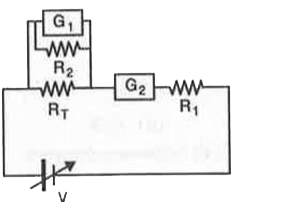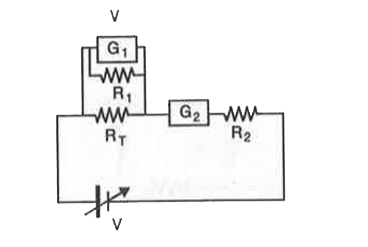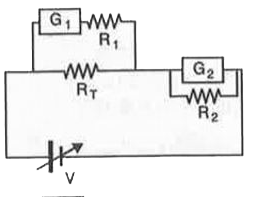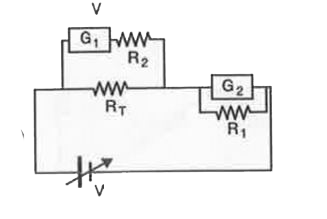To verify Ohm's law, a student is provided with a test resistor RT , a high resistance R1, a small resistance R2, two identical galvanometers G1 and G2, and a variable voltage source V. The correct circuit to carry out the experiment is :




The correct Answer is:C
J1=(2ER+2)2R,J2=(ER+1/2)2R
and J1=2.25J2
⇒(2E)2(R+2)2R=225100.(2E)2(2R+1)2.R
∴ On solving
R=4Ω
Topper's Solved these Questions
- CURRENT ELECTRICITYBOOK - MODERN PUBLICATIONCHAPTER - CURRENT ELECTRICITYEXERCISE - MULTIPLE CHOICE QUESTIONS ( LEVEL-II)
54 Videos
- CURRENT ELECTRICITYBOOK - MODERN PUBLICATIONCHAPTER - CURRENT ELECTRICITYEXERCISE - MULTIPLE CHOICE QUESTIONS (PARAGRAPH QUESTIONS)
2 Videos
- ATOMS, MOLECULES AND NUCLEIBOOK - MODERN PUBLICATIONCHAPTER - ATOMS, MOLECULES AND NUCLEIEXERCISE - Recent Competitive Questions
40 Videos
- DESCRIPTION OF MOTION IN ONE DIMENSION BOOK - MODERN PUBLICATIONCHAPTER - DESCRIPTION OF MOTION IN ONE DIMENSION EXERCISE - Revision Test
45 Videos
Similar Questions
To verify Ohm's law, a student is provided with a test resistor RT, a high resistance R1 . a small resistance R2, two identical galvometers G1 and G2 and voltage source V. The correct circuit to carry out the experiment is.
View SolutionTo verify Ohm's law, a student is provided with a test resistor RT, a high resistance R1 . a small resistance R2, two identical galvometers G1 and G2 and voltage source V. The correct circuit to carry out the experiment is.
View Solution
Knowledge Check
Two resistors of resistance R1 and R2 having R1>R2 are connected in parallel. For equivalent resistance R, the correct statement is
AR>R1+R2BR1<R<R2CR2<R<(R1+R2)DR<R1If G,rA and rV denote the internal resistances of a galvanometer, an ammeter and a voltmeter among the following the correct relationship is
AG<rA<rVBrA<rV<GCrA<G<rVDrV<rA<GConsider two identical galvanometers and two identical resistors with resistance R. If the internal resistance of the galvanometers Rc<R/2, which of the following statement(s) about any one of the galvanometers is (are) true?
AThe maximum voltage range is obtained when the two resistors and one galvanometer are connected in seriesBThe maximum voltage range is obtained when the two resistors and one galvanometer are connected in series , and the second galvanometer is connected in parallel to the first galvanometerCThe maximum current range is obtained when all the components are connected in parallelDThe maximum current range is obtained when the two galvanometers are connected in series and the combination is connected in parallel with both the resistors
You are provided with one low resistance R1 and one high resistance RH, and two galvanometers. One galvanometer is to be converted to an ammeter and the other to a voltmeter. Show how you will do this with the help of simple, labelled diagrams.
View SolutionIn the curcuit given below D1 and D2 are two identicall diodes and V is a sinusoidal voltage source the voltage drop across the resistance RL

View SolutionTwo resistors of resistance R1 and R2 having R1>R2 are connected in parallel. For equivalent resistance R, the correct statement is
View SolutionTwo resistors of resistance R1 and R2 having R1>R2 are connected in parallel. For equivalent resistance R, the correct statement is
View SolutionConsider two identical galvanometers and two identical resistors with resistance R. If the internal resistance of the galvanometers Rc<R/2, which of the following statement(s) about any one of the galvanometers is (are) true?
View Solution
